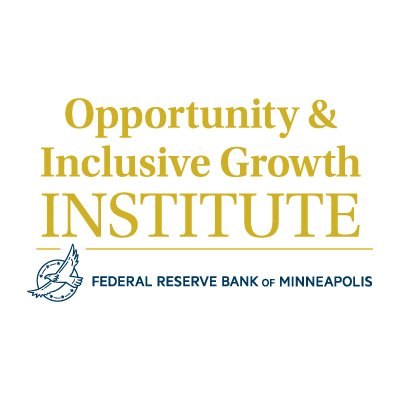
Lukas Mann
@lukasfmann
Followers
511
Following
229
Media
3
Statuses
54
Economist, Macro+Labor. Assistant Professor @WPCareySchool @ASU.
Joined February 2012
Great fun to present "Job Transformation, Specialization, and the Labor Market Effects of AI" (joint with the fantastic @lukasfmann) @nberpubs EFG Fall Meeting today! 🔗to paper in tweet below. Thanks to @glviolante & Corina Boar for organizing & including us in the program!
1
12
76
0
17
41
HIRING NEWS at @AsuEcon. At ASU Economics @WPCareySchool, we will have two Open Field positions in this job-market season. Postings will be up in JOE soon. Stay tuned!
1
31
98
Very much looking forward to our @BostonCollege workshop on *The Macro & Labor Market Consequences of AI* this Friday! Featuring🎙️by Pascual Restrepo, @lukasfmann, @DanialLashkari, Jaromir Nosal, @AndersPHumlum, @L_Schmidt_Econ & a Keynote by @raffasadun.
3
15
111
Rapid advances in AI means machines may take over an expanding set of tasks. Who will gain and who will lose from this wave of automation? Visiting scholars @_LukasFreund_ @BostonCollege & @lukasfmann @WPCareySchool answer this question in their new paper. https://t.co/tnjwcbCSBG
0
2
4
Excited to see the @OIGInstitute WP of "Job Transformation, Specialization, and the Labor Market Effects of AI" with the fantastic @lukasfmann!
Rapid advances in AI means machines may take over an expanding set of tasks. Who will gain and who will lose from this wave of automation? Visiting scholars @_LukasFreund_ @BostonCollege & @lukasfmann @WPCareySchool answer this question in their new paper. https://t.co/tnjwcbCSBG
1
6
36
Rapid advances in AI means machines may take over an expanding set of tasks. Who will gain and who will lose from this wave of automation? Visiting scholars @_LukasFreund_ @BostonCollege & @lukasfmann @WPCareySchool answer this question in their new paper. https://t.co/tnjwcbCSBG
0
1
3
👇What @emollick says (@Noahpinion @Afinetheorem have repeatedly raised this caveat, too) @lukasfmann & I develop and quantify this idea through a formal model in our recent paper on "Job Transformation, Specialization, and the Labor Market Effects of AI"
I keep seeing this paper (and the others like it) being misinterpreted. This is a measure of AI applicability, not job loss. That might mean the jobs are at risk, but it also can be the jobs that will be most benefitted by using AI, or those that will be most transformed by it.
1
17
90
Highly relevant! "Job Transformation, Specialization, and the Labor Market Effects of AI" by Lukas B. Freund and Lukas F. Mann. "...we show that job transformation—a shift in the task content of jobs—creates large and heterogeneous earnings effects." https://t.co/UPMmBZaTGj
0
15
68
Why has inequality across space increased in so many countries? By measuring how workers and firms sort across space, @lukasfmann deepens our understanding of regional differences and guides how it might be addressed.
minneapolisfed.org
Messy realities, macroeconomic consequences
0
3
3
The emergence of remote work explains the peculiar labor market dynamics after the pandemic, from Sadhika Bagga, @lukasfmann, Ayşegül Şahin, and @glviolante
https://t.co/RhkGQx8xbs
7
12
21
1/2: "Hot" or not? Learning the right lessons from the labor market after COVID. Short piece in which I try to stitch together messages from two great papers, and some small Q&A with some of their authors, Erik Hurst, and @glviolante [ https://t.co/L5pfTrFMrj]
1
7
66
Visiting scholar @lukasfmann @WPCareySchool explores the messy realities of job transitions post-Great Recession. His research sheds light on how workers navigate the labor market and the economic implications of AI. In For All: https://t.co/Ydfkh8eWER
minneapolisfed.org
Messy realities, macroeconomic consequences
0
1
2
.@agoodmanbacon spotlights how visiting scholar @lukasfmann @WPCareySchool @ASU is reshaping our understanding of labor markets by developing realistic models of job searching, as people only learn slowly how in-demand their skills are. Read the column: https://t.co/Ydfkh8eWER
minneapolisfed.org
Messy realities, macroeconomic consequences
0
2
5
Simon Margolin's (@simon_margolin) job market paper studies how corporate tax reforms pass through to workers’ welfare. https://t.co/CFmkSJoSzL
1
10
27
Gianluca Violante @glviolante talked about "Job Amenity Shocks and Labor Reallocation" Here the paper: https://t.co/U73qXiUVNr
Xavier Ragot talked about "Non-Keynesian stabilizers and inflation dynamics" Here is the paper: https://t.co/UyKRmr6dZh
0
2
15
Workers likely don't have perfect information about their options in the labor market. Super interesting new JME paper by @lukasfmann & @jake_bradley88 shows that incorporating this feature helps align theory with data. One finding: the cost of missing information is large!
Super happy that my first publication, co-authored with @jake_bradley88 , is now available in the JME! https://t.co/teDRaSK7hv We ask what happens if you introduce informational frictions to a standard search and matching model of the labor market. It turns out that... (1/6)
0
3
20
(1) - (4) are consistent with the data but inconsistent with the standard models (= no informational frictions). (5) implies that efforts to inform workers about their outside options have potentially massive GE benefits. Be sure to check out the paper for more details! (6/6)
0
0
3
(4) Endogenous wage rigidity and shock amplification - workers need time to learn about a new aggregate state. (5) Massive welfare losses (34%) relative to a full information world, because of missing information about viable outside options. (5/6)
1
0
1
(1) Biased beliefs - workers with low job finding rates overestimate their job finding rates and vice versa. (2) Large frictional wage dispersion induced by dispersed beliefs. (3) Wages that fall in unemployment duration as workers become increasingly pessimistic. (4/6)
1
0
1










